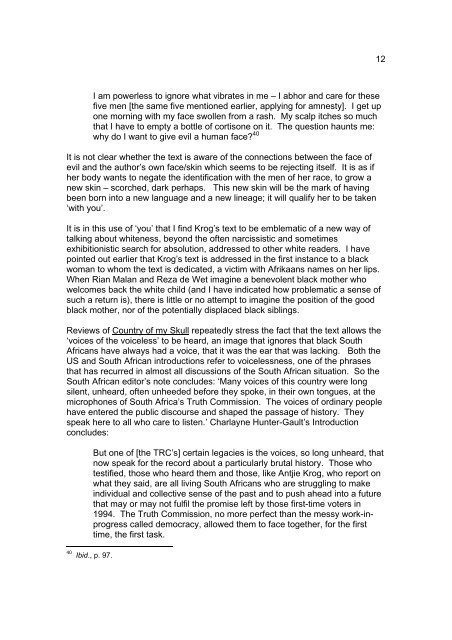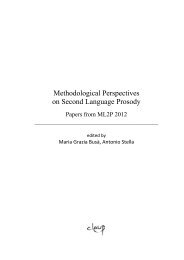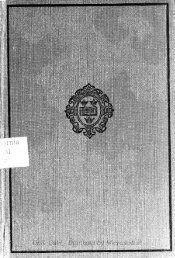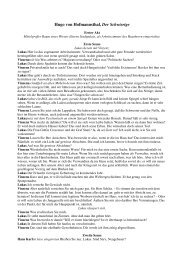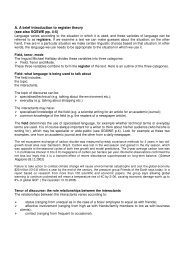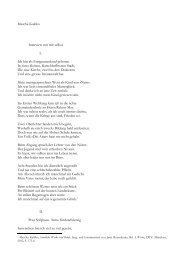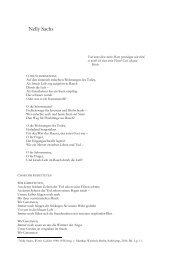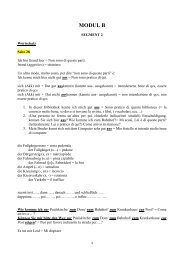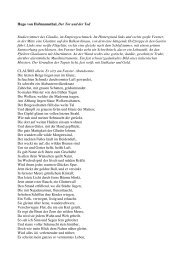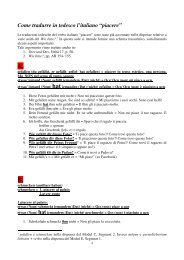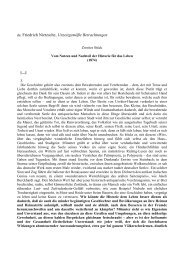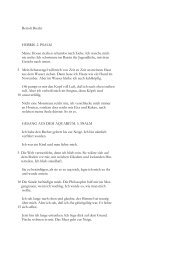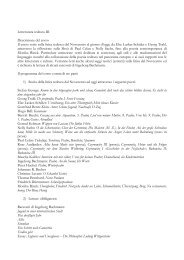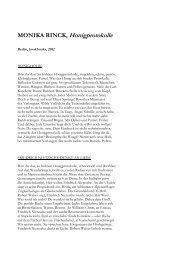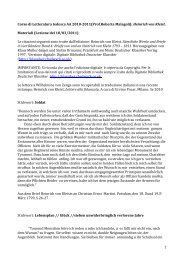1 They Never Wept, the Men of my Race: Antjie Krog's Country of my ...
1 They Never Wept, the Men of my Race: Antjie Krog's Country of my ...
1 They Never Wept, the Men of my Race: Antjie Krog's Country of my ...
You also want an ePaper? Increase the reach of your titles
YUMPU automatically turns print PDFs into web optimized ePapers that Google loves.
12<br />
I am powerless to ignore what vibrates in me – I abhor and care for <strong>the</strong>se<br />
five men [<strong>the</strong> same five mentioned earlier, applying for amnesty]. I get up<br />
one morning with <strong>my</strong> face swollen from a rash. My scalp itches so much<br />
that I have to empty a bottle <strong>of</strong> cortisone on it. The question haunts me:<br />
why do I want to give evil a human face? 40<br />
It is not clear whe<strong>the</strong>r <strong>the</strong> text is aware <strong>of</strong> <strong>the</strong> connections between <strong>the</strong> face <strong>of</strong><br />
evil and <strong>the</strong> author’s own face/skin which seems to be rejecting itself. It is as if<br />
her body wants to negate <strong>the</strong> identification with <strong>the</strong> men <strong>of</strong> her race, to grow a<br />
new skin – scorched, dark perhaps. This new skin will be <strong>the</strong> mark <strong>of</strong> having<br />
been born into a new language and a new lineage; it will qualify her to be taken<br />
‘with you’.<br />
It is in this use <strong>of</strong> ‘you’ that I find Krog’s text to be emblematic <strong>of</strong> a new way <strong>of</strong><br />
talking about whiteness, beyond <strong>the</strong> <strong>of</strong>ten narcissistic and sometimes<br />
exhibitionistic search for absolution, addressed to o<strong>the</strong>r white readers. I have<br />
pointed out earlier that Krog’s text is addressed in <strong>the</strong> first instance to a black<br />
woman to whom <strong>the</strong> text is dedicated, a victim with Afrikaans names on her lips.<br />
When Rian Malan and Reza de Wet imagine a benevolent black mo<strong>the</strong>r who<br />
welcomes back <strong>the</strong> white child (and I have indicated how problematic a sense <strong>of</strong><br />
such a return is), <strong>the</strong>re is little or no attempt to imagine <strong>the</strong> position <strong>of</strong> <strong>the</strong> good<br />
black mo<strong>the</strong>r, nor <strong>of</strong> <strong>the</strong> potentially displaced black siblings.<br />
Reviews <strong>of</strong> <strong>Country</strong> <strong>of</strong> <strong>my</strong> Skull repeatedly stress <strong>the</strong> fact that <strong>the</strong> text allows <strong>the</strong><br />
‘voices <strong>of</strong> <strong>the</strong> voiceless’ to be heard, an image that ignores that black South<br />
Africans have always had a voice, that it was <strong>the</strong> ear that was lacking. Both <strong>the</strong><br />
US and South African introductions refer to voicelessness, one <strong>of</strong> <strong>the</strong> phrases<br />
that has recurred in almost all discussions <strong>of</strong> <strong>the</strong> South African situation. So <strong>the</strong><br />
South African editor’s note concludes: ‘Many voices <strong>of</strong> this country were long<br />
silent, unheard, <strong>of</strong>ten unheeded before <strong>the</strong>y spoke, in <strong>the</strong>ir own tongues, at <strong>the</strong><br />
microphones <strong>of</strong> South Africa’s Truth Commission. The voices <strong>of</strong> ordinary people<br />
have entered <strong>the</strong> public discourse and shaped <strong>the</strong> passage <strong>of</strong> history. <strong>They</strong><br />
speak here to all who care to listen.’ Charlayne Hunter-Gault’s Introduction<br />
concludes:<br />
40 Ibid., p. 97.<br />
But one <strong>of</strong> [<strong>the</strong> TRC’s] certain legacies is <strong>the</strong> voices, so long unheard, that<br />
now speak for <strong>the</strong> record about a particularly brutal history. Those who<br />
testified, those who heard <strong>the</strong>m and those, like <strong>Antjie</strong> Krog, who report on<br />
what <strong>the</strong>y said, are all living South Africans who are struggling to make<br />
individual and collective sense <strong>of</strong> <strong>the</strong> past and to push ahead into a future<br />
that may or may not fulfil <strong>the</strong> promise left by those first-time voters in<br />
1994. The Truth Commission, no more perfect than <strong>the</strong> messy work-inprogress<br />
called democracy, allowed <strong>the</strong>m to face toge<strong>the</strong>r, for <strong>the</strong> first<br />
time, <strong>the</strong> first task.


